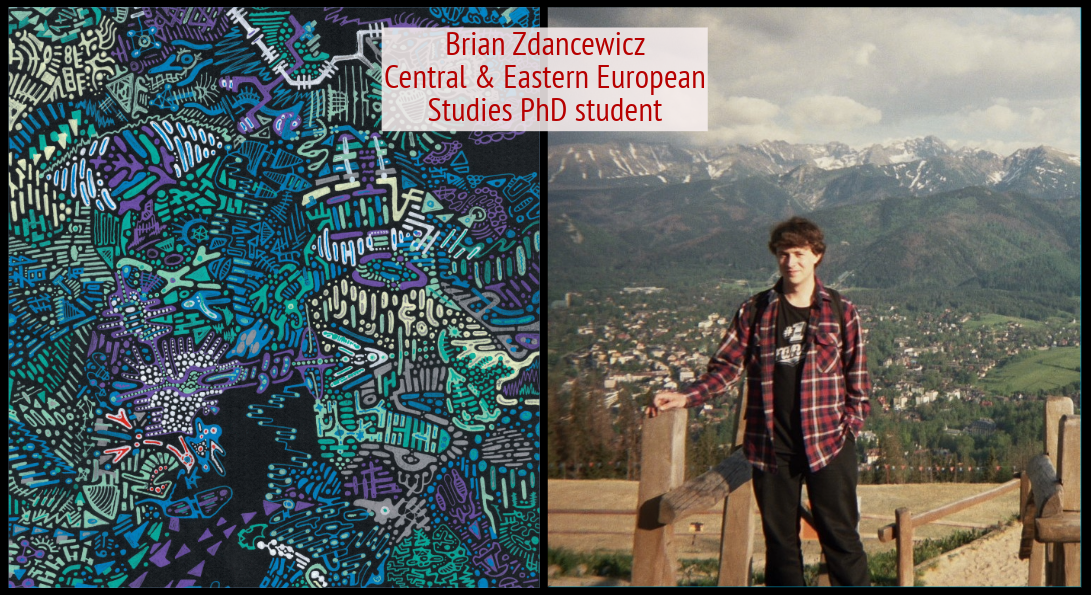Brian Zdancewicz

Brian Zdancewicz, UIC Central & Eastern European Studies PhD student
I am Brian Zdancewicz, PhD student in Central & Eastern European Studies with a concentration in Russian & Soviet culture. I have been at UIC since Fall 2018, when I started attending graduate seminars, teaching language and culture courses for the Department of Polish, Russian, and Lithuanian Studies (PRLS), and working for the LCLC. During my time at UIC (six years and counting at the time of this update!), I have occupied many different roles here. I have taken a wide array of classes, from 100-level language courses to graduate critical theory seminars; I have taught Russian language and Soviet culture for several semesters, and I hope to teach linguistics and philosophy classes one day as well; I have supported undergrad peer tutors and LCSL instructors as a member of the LCLC; and I have made connections outside the languages through my involvement with the Graduate Employees Organization (GEO). Naturally, my intertwined and interdependent interests in languages, verbal arts, and linguistics have acted as a driving and structuring force for all of the above pursuits.
I think that my language story began with German language classes I took throughout high school. I quickly found that exploring a new language was fun and exciting for me. In addition to opening up a world of German-language media, I loved the intellectual exercise of mastering grammar systems and creating things of my own (even silly comics in my notes for other classes) in a new language. Around this time, I also developed an interest in conlanging (making languages of my own with writing systems, words, etc.) as well, though I suppose I did not really know what I was doing (but we learn through experience, after all!). Back then I had no idea what course my life would take, but in hindsight, it's clear to me that I was developing a philologist's mindset already.
Later on, I began to explore Slavic languages. Initially I was just interested in Polish due to family history (evident in my surname, Zdancewicz); soon I began (clumsily, haphazardly) dabbling with Russian thanks in part to reading (and enjoying) Dostoevsky’s Crime and Punishment for a "world literature" (!) class during my senior year of high school. My long-standing interest in "world" music also drove me to explore Russian, Polish, and Yugoslavian bands alongside the Japanese, German, Nigerian, Greenlandic, Brazilian, and other national-regional musics I liked. Thanks to largely unstructured organic exposure, I was acquiring bits and pieces of Russian, Polish, and Serbian through song lyrics, but had not yet had any opportunity to learn in a controlled setting.
When I started university at Penn State, I began taking college courses in Russian. I did not really intend to major in it (I meandered through Biology and CompSci on my way to linguistics in my sophomore year), but I took a liking to my classes and to my first flashes of bilingualism – particularly the abovementioned access to music and to new creative capacities. By my senior year, Polish courses appeared for the first time at my university, which I eagerly signed up for. Right as I was developing a serious curiosity for historical linguistics, learning a related-but-separate Slavic language made me feel like my experience with Russian was transfigured from mono to stereo, so to speak – a feeling that would only intensify once graduate seminars pulled me into modest but eye-opening encounters with Greek, Latin, German, French, and even good old English itself. Moreover, I rapidly improved as an artist during this time, and I would frequently incorporate fragments of Russian, Polish, German, Finnish, and other text into things I made (see above or head over to my Instagram page if you're curious).
Eventually I wound up here at UIC, doing all the things I mentioned in the first paragraph, continuing to grow and explore as I've always felt internally compelled to do. It's been a long, winding, sometimes stressful, somewhat indescribable, but ultimately rewarding journey so far. As a student, I've gotten acquainted with topics of philosophy, semiotics, literary analysis, critical methodologies, and more that I had never engaged with or really known about before. I also feel much more confident and precise when writing: it was a fairly weak point for me in high school that I improved during undergrad, but ever since 2018, I feel like I've not only become a better writer but a clearer and sharper thinker as well. As an instructor, I am still figuring out myself and my approach. When I teach, I acknowledge the need to impart certain information and skills (e.g., acquiring key constructions and conjugations in a language class, or explaining what a Socialist Realism is in a culture class), but around and beyond that goal, I hope to make these abstract things personal, meaningful, and memorable. When we work with languages and/or literatures, I think that the substance, texture, and product(s) of an encounter between learner and topic are inherently unpredictable, which in fact is a good thing: our work sparks moments of discovery, creation, and productive struggle rather than 1-to-1 transferences of discrete knowledge from Me, the Teacher who has knowledge to You, the Learner who seeks it (not coincidentally, this mirrors my outlook on most things now). I hope never to forget or lose track of the student experience (that's one reason I still take classes besides my required ones, aside from the enrichment offered by the class per se), and I hope I can always find ways to make the things I teach not only interesting and accessible but also open-ended, illuminating the many directions and meanings one can make from the material with a bit of effort and curiosity.